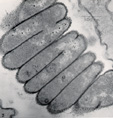
BIOL
230
MICROBIOLOGY
LECTURE E-TEXT
UNIT 3
MICROBIOLOGY
LECTURE E-TEXT
UNIT 3
 |
BIOL
230
MICROBIOLOGY LECTURE E-TEXT UNIT 3 |
MICROBIOLOGY LEARNING OBJECTS
UNIT 3
BACTERIAL PATHOGENESIS
TABLE OF CONTENTS
TOPICS